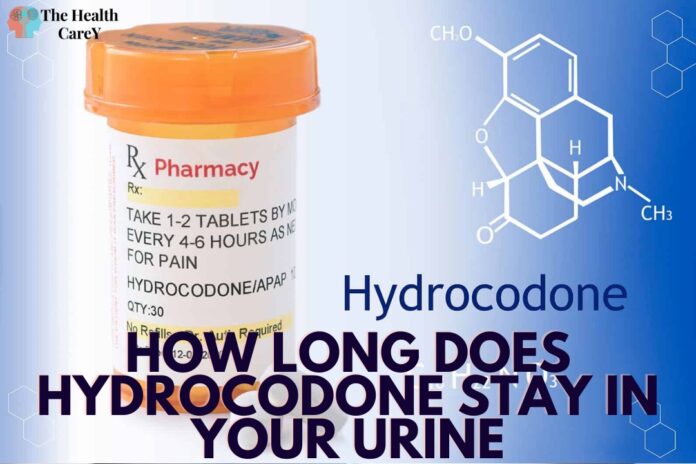If you have recently taken hydrocodone, you may be wondering how long it will stay in your urine. Hydrocodone is a prescription opioid pain medication that is commonly used to treat moderate to severe pain. It works by binding to opioid receptors in the brain and spinal cord, which can provide relief from pain. However, like all opioids, hydrocodone can be addictive and may cause side effects such as drowsiness, dizziness, and constipation.
The length of time that hydrocodone stays in your urine can vary depending on several factors, including your age, weight, metabolism, and overall health. In general, hydrocodone can be detected in urine for up to four days after the last dose. However, this detection window may be longer for individuals who have been taking hydrocodone for an extended period or who have taken high doses of the drug. It is important to note that drug tests can detect even trace amounts of hydrocodone in urine, so it is essential to follow any prescribed dosages and avoid taking the drug without a doctor’s supervision.
How Long Does Hydrocodone Stay in Your System?
If you have taken hydrocodone, you may wonder how long it will stay in your system. The answer depends on several factors, such as your age, weight, metabolism, and dosage. Here is a general guide to how long hydrocodone can be detected in your urine, blood, and saliva.
Urine
Hydrocodone can be detected in your urine for up to 3-4 days after your last dose. However, this can vary depending on how much you took, how often you took it, and your overall health. If you are a chronic user, hydrocodone may stay in your urine for longer periods of time.
Blood
Hydrocodone can be detected in your blood for up to 24 hours after your last dose. However, this can vary depending on how much you took, how often you took it, and your overall health. Blood tests are not commonly used to detect hydrocodone use, as it is not the most reliable method.
Saliva
Hydrocodone can be detected in your saliva for up to 1-4 days after your last dose. However, this can vary depending on how much you took, how often you took it, and your overall health. Saliva tests are becoming more popular for detecting hydrocodone use, as they are non-invasive and can be done on-site.
It is important to note that these are general guidelines and individual results may vary. Additionally, different drug tests may have different detection windows for hydrocodone. If you are concerned about how long hydrocodone will stay in your system, it is best to consult with a healthcare professional.
How the Body Processes Hydrocodone?
When you take hydrocodone, your body metabolizes it into several different compounds. The primary metabolite is hydromorphone, which is also an opioid pain reliever. This means that hydrocodone is converted into a substance that has similar effects on your body.
Hydrocodone is metabolized in the liver by enzymes called cytochrome P450s. These enzymes break down the drug into smaller molecules that can be eliminated from your body. However, the rate at which hydrocodone is metabolized can vary widely between individuals, depending on factors such as age, gender, and liver function.
Once hydrocodone is broken down into its metabolites, they are eliminated from your body through urine. The length of time that hydrocodone can be detected in your urine depends on several factors, including the dose you took, how frequently you take the drug, and your individual metabolism.
In general, hydrocodone can be detected in urine for up to 3-4 days after the last dose. However, in some cases, it may be detectable for up to a week or more. It’s important to note that drug tests can detect even trace amounts of hydrocodone, so it’s best to avoid taking the drug if you know you will be subjected to a drug test.
How Long Does 5mg Hydrocodone Stay in Your Urine
Hydrocodone is a narcotic pain medication that is commonly prescribed to treat moderate to severe pain. It is important to understand how long it stays in your urine, especially if you are required to take a drug test.
The half-life of hydrocodone is approximately 4 hours, meaning that it takes about 4 hours for half of the drug to be eliminated from your body. However, it can take up to 24 hours for hydrocodone to be completely eliminated from your urine.
The amount of time it takes for hydrocodone to be eliminated from your urine can vary depending on a number of factors, including your age, weight, metabolism, and how much of the drug you have taken. In general, the more hydrocodone you take, the longer it will stay in your system.
It is important to note that drug tests can detect hydrocodone for up to 2-4 days after you have taken it. If you are required to take a drug test, it is important to inform the testing facility that you have been prescribed hydrocodone so that they can take this into account when interpreting the results.
In conclusion, 5mg of hydrocodone can stay in your urine for up to 24 hours, but can be detected by drug tests for up to 2-4 days. The amount of time it stays in your system can vary depending on a number of factors, so it is important to be aware of this if you are required to take a drug test.
Factors Affecting Hydrocodone Metabolism
Hydrocodone is a commonly prescribed opioid pain medication that is often detected in urine drug tests. However, the length of time hydrocodone stays in your urine can vary depending on various factors.
Age and Health
Age and overall health can play a role in how quickly your body metabolizes hydrocodone. As you age, your liver and kidneys may not function as efficiently, which can slow down the elimination of hydrocodone from your system. Additionally, individuals with liver or kidney disease may also have a slower metabolism of hydrocodone, leading to a longer detection window in urine tests.
Hydration and Body Mass
Your hydration levels and body mass can also affect how long hydrocodone stays in your urine. Drinking plenty of fluids can help flush the drug out of your system more quickly, while dehydration can prolong the detection window. Additionally, individuals with a higher body mass may have a longer detection window due to the drug being stored in fatty tissue.
Frequency and Dosage of Use
The frequency and dosage of hydrocodone use can also impact the detection window in urine tests. Individuals who use hydrocodone frequently or in high doses may have a longer detection window due to the drug building up in their system. Additionally, individuals who have used hydrocodone for an extended period of time may have a longer detection window due to the drug being stored in their body.
In summary, the length of time hydrocodone stays in your urine can vary depending on several factors, including age and health, hydration and body mass, and frequency and dosage of use. It is important to note that detection windows can also vary depending on the type of drug test being used.
Detection Windows for Hydrocodone
Hydrocodone is a prescription opioid used to treat pain. It is also known as dihydrocodeinone. If you are taking hydrocodone, you might be wondering how long it stays in your system. The detection window for hydrocodone depends on the method of testing and other factors.
Urine
Urine testing is the most common way to detect hydrocodone. Hydrocodone can be detected in urine for up to 3-4 days after the last dose. However, if you are a chronic user, hydrocodone can be detected in urine for up to 6 days or longer.
Blood
Blood testing is not commonly used to detect hydrocodone. Hydrocodone can be detected in blood for up to 24 hours after the last dose.
Saliva
Saliva testing is not commonly used to detect hydrocodone. Hydrocodone can be detected in saliva for up to 36 hours after the last dose.
Hair
Hair testing is not commonly used to detect hydrocodone. Hydrocodone can be detected in hair for up to 90 days after the last dose.
It is important to note that the detection window for hydrocodone can vary depending on several factors such as age, weight, metabolism, and frequency of use. Additionally, the sensitivity of the testing method can also affect the detection window.
Hydrocodone and Drug Testing
If you have taken hydrocodone, you may be wondering how long it will stay in your urine. This is an important question if you are facing a drug test, as hydrocodone is a controlled substance that can show up on drug tests.
The length of time that hydrocodone stays in your urine depends on a variety of factors, including your age, weight, metabolism, and how much hydrocodone you have taken. In general, however, hydrocodone can be detected in urine for up to 3-4 days after the last dose.
It’s important to note that drug tests can detect hydrocodone at very low levels, so even if you have stopped taking the drug, it may still show up on a drug test. If you are facing a drug test and have taken hydrocodone, it’s important to be honest with the tester about your drug use.
Some factors that can affect how long hydrocodone stays in your urine include:
- Age: Older individuals may eliminate hydrocodone from their bodies more slowly than younger individuals.
- Weight: Heavier individuals may eliminate hydrocodone more slowly than lighter individuals.
- Metabolism: Individuals with slower metabolisms may eliminate hydrocodone more slowly than those with faster metabolisms.
- Dose: Higher doses of hydrocodone may take longer to eliminate from the body than lower doses.
Overall, if you are facing a drug test and have taken hydrocodone, it’s important to be aware of how long the drug can stay in your urine. While the length of time can vary depending on individual factors, in general, hydrocodone can be detected in urine for up to 3-4 days after the last dose.
Implications for Health and Safety
Hydrocodone is a potent opioid painkiller that can cause serious health and safety risks if misused or abused. Understanding how long it stays in your system is crucial for ensuring your safety and the safety of others.
If you are prescribed hydrocodone, it is important to follow your doctor’s instructions carefully and only take the medication as directed. Taking more than prescribed or using it for non-medical purposes can lead to addiction, overdose, and other serious health problems.
If you are taking hydrocodone and need to operate heavy machinery or drive a vehicle, it is important to be aware of how the medication may affect your ability to function. Hydrocodone can cause drowsiness, dizziness, and impaired judgment, which can increase your risk of accidents and injuries.
In addition, if you are undergoing drug testing for employment or other reasons, it is important to be aware of how long hydrocodone can stay in your system. Depending on various factors such as your age, weight, and metabolism, hydrocodone can remain detectable in your urine for up to 4 days after your last dose.
Overall, it is important to use hydrocodone responsibly and in accordance with your doctor’s instructions to minimize the risks to your health and safety.
Conclusion
In conclusion, the detection time of hydrocodone in urine can vary depending on various factors such as the dosage, frequency of use, and individual metabolic rate. Generally, hydrocodone can be detected in urine for up to 3-4 days after the last use, but it can be detected for up to a week or more in heavy or chronic users.
It is important to note that drug testing methods and cutoff levels can also affect the detection time of hydrocodone in urine. Therefore, it is recommended to consult with a healthcare professional or drug testing laboratory for more accurate information on drug testing and detection.
It is also important to use hydrocodone only as prescribed by a healthcare professional and to follow proper disposal methods to prevent misuse and abuse. If you are struggling with hydrocodone addiction or misuse, seek help from a healthcare professional or addiction treatment center.
Frequently Asked Questions
How long does hydrocodone stay in urine?
Hydrocodone can be detected in urine for up to 3-4 days after the last use. However, the detection window may vary depending on factors such as the dose, frequency of use, and individual metabolism.
Can drinking water affect a hydrocodone urine test?
Drinking water in large amounts before a urine test may dilute the urine and lower the concentration of hydrocodone, which can result in a false negative test. However, it is important to stay hydrated to avoid dehydration and other health problems.
What is the detection window for hydrocodone in urine?
The detection window for hydrocodone in urine is typically 2-4 days after the last use. However, the detection time may vary based on factors such as the dose, frequency of use, and individual metabolism.
What factors affect how long hydrocodone stays in urine?
Several factors can affect how long hydrocodone stays in urine, including the dose, frequency of use, individual metabolism, age, weight, and overall health. Other factors such as drug interactions, liver and kidney function, and hydration levels may also play a role.
What are common side effects of hydrocodone use?
Common side effects of hydrocodone use include dizziness, drowsiness, nausea, vomiting, constipation, and respiratory depression. Other less common side effects may include confusion, mood changes, and allergic reactions.
What is the difference between hydrocodone and oxycodone?
Hydrocodone and oxycodone are both opioid pain medications used to treat moderate to severe pain. However, hydrocodone is usually combined with other pain relievers such as acetaminophen, while oxycodone is often prescribed alone. Additionally, oxycodone is generally considered to be more potent than hydrocodone.





















